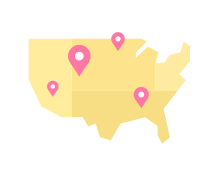

Find Washington business insurance in three easy steps

Fill out an online application that reaches top carriers

Review Washington's insurance requirements

Compare quotes and buy affordable coverage today
Recommended insurance policies for small businesses in Washington
These insurance policies defend small business owners in Washington state against common lawsuits and other top risks.
General liability insurance
A general liability policy covers common third-party risks for small businesses in Washington, including customer property damage and injuries. Commercial leases often require this coverage.
- Customer injuries at your company
- Damaged customer property
- Slander and other advertising injuries
Errors and omissions insurance
This policy is also called professional liability insurance. It protects professionals against lawsuits over mistakes, missed deadlines, and oversights.
- Work errors and oversights
- Professional negligence lawsuits
- Late or incomplete work
Professional liability insurance
This type of coverage protects Washington businesses against lawsuits related to the quality of their professional services or advice. It's sometimes referred to as E&O insurance.
- Mistakes and oversights
- Breach of contract
- Missed deadlines
Business owner’s policy
A BOP bundles commercial property insurance and general liability coverage. It covers costs from common third-party lawsuits and business property damage.
- Customer injuries
- Damaged customer property
- Damaged business property
Workers' comp insurance
Washington requires small businesses that have one or more employees to purchase workers’ compensation insurance through the state fund. This policy covers medical costs from work injuries.
- Employee medical expenses
- Disability benefits
- Legal costs from employee injuries
Cyber insurance
This policy protects Washington small businesses against financial losses from data breaches and cyberattacks. It’s also called cyber liability insurance or cybersecurity insurance.
- Data breach investigations
- Customer notification expenses
- Ransomware attacks
Commercial auto insurance
This policy is required for vehicles owned by Washington small businesses. It helps cover the cost of an accident involving your commercial vehicle, including lawsuits from other drivers.
- Injuries caused by your vehicle
- Property damage caused by your vehicle
- Vehicle theft and vandalism
Fidelity bonds
A fidelity bond reimburses your clients in the event of employee theft. Your clients may ask you to secure a bond before they will work with your business.
- Illegal electronic funds transfer
- Forged signatures
- Theft of cash or property
Commercial umbrella insurance
An umbrella policy boosts the coverage of your general liability, commercial auto, and employer's liability insurance. It can help your small business comply with requests for higher liability limits.
- Personal injury lawsuits
- Auto accident lawsuits
- Workplace injury lawsuits
Looking for different coverage? Check out our other policies.
What are the small business insurance requirements in Washington?
State laws can affect which insurance products you need for your small business. These types of insurance are required in Washington.
Workers' compensation insurance
Washington state law requires businesses that have one or more employees, full-time or part-time, to carry workers’ compensation insurance. Workers' comp covers medical bills for workplace injuries and provides disability benefits for injured Washington workers.
Sole proprietors sometimes choose to carry this coverage, as personal health insurance won't cover injuries that are related to your job.
Washington is one of four states that operates a monopolistic state fund for workers' compensation. That means employers cannot buy workers' comp from private insurers, only from the state fund.
These policies do not include employer's liability insurance, which provides financial protection against employee injury lawsuits. You can purchase this coverage from a private insurance provider.
Commercial auto insurance
Vehicles owned by limited liability companies (LLCs), startups, and other businesses in Washington must be covered by commercial auto insurance. This policy covers financial losses from auto accidents involving your business vehicle.
Washington state law requires auto liability coverage in the amount of:
- Bodily injury liability: $25,000 per person / $50,000 per accident
- Property damage liability: $10,000 per accident
Personal, rented, and leased vehicles driven for work purposes should be covered by hired and non-owned auto insurance (HNOA), as personal auto policies usually exclude business use. It can be added to commercial general liability insurance or a business owner's policy.
How much does small business insurance cost in Washington?

Commercial insurance can be affordable for small businesses with low risks. Average costs for TechInsurance customers in the state of Washington are:
General liability: $42 per month
Professional liability / E&O: $75 per month
Business owner's policy: $63 per month
Factors that influence the cost of business insurance include:
- Your profession
- Business operations
- Number of employees
- Types of business insurance purchased
- Policy limits and deductibles
- Coverage options
- Claims history
Why Washington business owners choose TechInsurance
Gain financial protection
The costs from a lawsuit or data breach can overwhelm a small business. Protect against common risks with the right business insurance coverage.

Find insurance policies for your small business in Washington
Whether you need coverage to sign a contract, rent an office, or get a license, TechInsurance can help you find the right business insurance policies. Our insurance agents are licensed in Washington and can help you find affordable policies from top-rated insurance companies.
Get started today by filling out our easy application. You can chat with an agent about your business insurance needs and get answers to any questions. When you're ready, pay for a policy online and get a certificate of insurance (COI) immediately to show clients that your business is protected.
Hear from business owners like you who purchased insurance coverage.





























